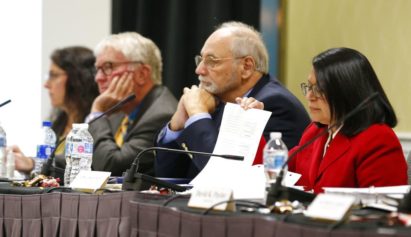The size of the tornado that caused such devastation in Oklahoma and predictions that there will be an especially active hurricane season later this year, not to mention above average snowfall in the mid-Atlantic and Northeast, have many people focusing on climate change and whether it can explain extremes in weather patterns.
“We strive for R&D that are ‘use-inspired’ and intended to improve our understanding of the world and yield applications that are used by society,” NOAA says in the draft report summary.
It’s an opportunity to put to rest the old adage that “Everyone talks about the weather, but no one does anything about it.”
Two years ago, NOAA launched Voyage to Discovery, an African-American maritime heritage website, as part of a wider initiative aimed at building public awareness about black maritime history. It also aimed at encouraging African-Americans to become engaged with the stewardship of the nation’s environmental resources through education and careers in the field.
In many urban communities, companies find little oversight, and ineffective or under-sourced civic associations cannot put up a strategic fight to force industrial polluters to adhere to current laws or make their operations greener.
In addition to focusing on the overall picture of climate change and the general impact of pollution on public health and recreation, it is also important to pay attention to dangers in local communities.
While a major plant might contribute to area pollution, the greatest danger often comes from small caches of cleaning supplies improperly stored in corner grocery stores, the local auto repair shop and other places in the heart of a neighborhood.
Coalitions of neighborhood groups, with varying resources, can outflank an industrial polluter whose firm separates affluent and working-class communities physically, but cause both areas similar health and environmental issues.
But first, it is important to study the issue and realize no one has to just live with the consequences of bad environmental stewardship.
If climate change becomes really personal it can begin to address a lot of problems. In addition to efforts to clean up air and water, create natural barriers to fire and floods and improve response times to natural disasters, it also opens up a variety of job and career opportunities that many people never realized existed.
Several years ago, the National Council of Churches USA, Eco-Justice Program cited African-Americans and Climate Change: An Unequal Burden, a Congressional Black Caucus Foundation report that found:
- Over 70 percent of African-Americans live in counties in violation of federal air pollution standards.
- Higher temperatures of global warming are expected to degrade air quality through increased ozone formation.
- In every major city in the U.S., blacks are more likely than whites to be exposed to higher air toxics concentrations.
- Asthma will increase because of global climate change and will disproportionately impact African-Americans, who are nearly three times as likely to be hospitalized, or killed by asthma,than whites.
The report also found that African-Americans in urban centers are harder hit by deaths caused by heat waves that worsen air pollution and that unemployment and economic hardship affected by climate change would affect the black community disproportionately.
So while we are saddened by and mourn the losses in Oklahoma and watch the news closely to see where the next weather disaster might hit, it would also behoove us to look at how our communities are affected by climate change, develop our personal emergency response plan and look for better prevention techniques that include us as strategic partners in their development.
Jackie Jones, a journalist and journalism educator, is director of the career transformation firm Jones Coaching LLC and author of “Taking Care of the Business of You: 7 Days to Getting Your Career on Track.”


